Filter by

The Greenhouse Gas Balance of Italy
The book addresses in a comprehensive way the full greenhouse gases budget of the Italian landscape, focusing on land use and terrestrial ecosystems. In recent years there has been a growing interest in the role of terrestrial ecosystems with regard to the carbon cycle and only recently a regional approach has been considered for its specificity in terms of new methodologies for observations an…
- Edition
- 1
- ISBN/ISSN
- 978-3-642-32424-6
- Collation
- VIII, 211, 27 b/w illustrations, 30 illustrations in colour
- Series Title
- Environmental Science and Engineering
- Call Number
- -
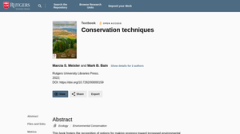
Conservation techniques
Overview: This book fosters the recognition of options for making progress toward increased environmental conservation through an understanding of the underlying science and practice of a variety of conservation techniques. Today, there are expected benefits from integrated science and practice, and many people are promoting this as the way forward to improve our environment. Over time, trends …
- Edition
- -
- ISBN/ISSN
- -
- Collation
- -
- Series Title
- -
- Call Number
- 333 MEI c
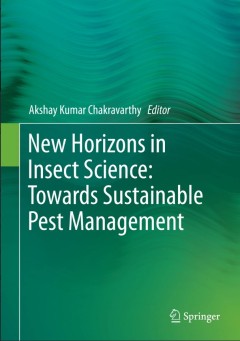
New Horizons in Insect Science: Towards Sustainable Pest Management
Insect science is fast changing as insects are evolving to a plethora of newer chemical molecules, climate change, management tactics and transformation of the landscapes. Through the International Conference, the editors have attempted to gather together newer aspects of Insect Sciences like Insect Taxonomy, DNA Barcoding, Physiology, Toxicology, Vectors and their Management, Molecular Biology…
- Edition
- 1
- ISBN/ISSN
- 978-81-322-2088-6
- Collation
- XXVII, 431
- Series Title
- -
- Call Number
- -
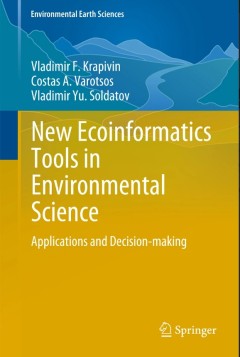
New Ecoinformatics Tools in Environmental Science:Applications and Decision-m…
This book provides new insights on the study of global environmental changes using the ecoinformatics tools and the adaptive-evolutionary technology of geoinformation monitoring. The main advantage of this book is that it gathers and presents extensive interdisciplinary expertise in the parameterization of global biogeochemical cycles and other environmental processes in the context of globaliz…
- Edition
- 1
- ISBN/ISSN
- 978-3-319-13977-7
- Collation
- XXXIII, 903
- Series Title
- Environmental Earth Sciences
- Call Number
- -

Chemistry and the Environment : A Chemistry Perspective for discussion of Env…
Chemistry and the Environment is designed to accompany a one-semester course in chemistry-based discussions of important environmental issues such as air pollution, the ozone layer, climate change and water quality. Chemical principles are introduced, followed by environmental ‘focus’ sections to base discussions on the scientific principles and societal intricacies of the individual topics…
- Edition
- -
- ISBN/ISSN
- -
- Collation
- -
- Series Title
- -
- Call Number
- 540 LAT c
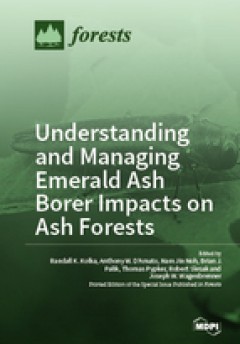
Understanding and Managing Emerald Ash Borer Impacts on Ash Forests
The emerald ash borer (EAB) is rapidly spreading throughout Eastern North America and devastating ecosystems where ash is a component tree. This rapid and sustained loss of ash trees has already resulted in ecological impacts on both terrestrial and aquatic ecosystems and is projected to be even more severe as EAB invades ash dominated wetlands of the western Great Lakes region. We propose a Sp…
- Edition
- -
- ISBN/ISSN
- 978-3-03897-165-8
- Collation
- -
- Series Title
- -
- Call Number
- 628 UND
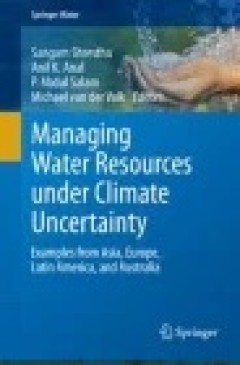
Managing Water Resources under Climate Uncertainty: Examples from Asia, Europ…
This book aims to come up with views to address the queries of planners, policymakers, and general people for water resources management under uncertainty of climate change, including examples from Asia and Europe with successful adaptive measures to change the challenge of climate change into opportunities. The availability of clean water is a major global challenge for the future due to a rap…
- Edition
- -
- ISBN/ISSN
- 978-3-319-10467-6
- Collation
- -
- Series Title
- -
- Call Number
- -
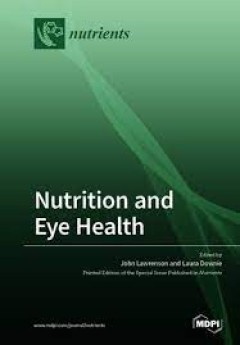
Nucleation of Minerals : Precursors, Intermediates and Their Use in Materials…
Nucleation is the key event in mineralisation, but a general molecular understanding of phase separation mechanisms is still missing, despite more than 100 years of research in this field. In recent years, many studies have highlighted the occurrence of precursors and intermediates, which seem to challenge the assumptions underlying classical theories of nucleation and growth. This is especiall…
- Edition
- -
- ISBN/ISSN
- 978-3-03897-036-1
- Collation
- -
- Series Title
- -
- Call Number
- 613 NUC
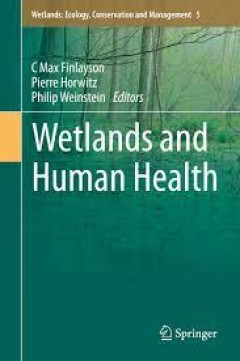
Wetlands and Human Health
The book addresses the interactions between wetlands and human health and well-being. A key feature is the linking of ecology-health and the targeting of practitioners and researchers. The environmental health problems of the 21st Century cannot be addressed by the traditional tools of ecologists or epidemiologists working in their respective disciplinary silos; this is clear from the emergence…
- Edition
- -
- ISBN/ISSN
- 978-94-017-9609-5
- Collation
- XII, 263
- Series Title
- -
- Call Number
- -
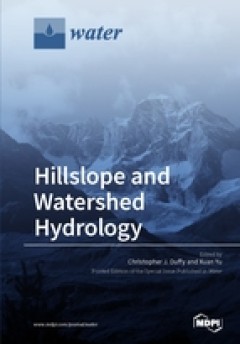
Hillslope and Watershed Hydrology
Watershed hydrology is driven by climate forcing, near ground surface characteristics, and human activities, addressing a wide spectrum of environmental and water resource problems regarding both scientific-driven questions and practical engineering issues. This book collates watershed problems and solutions from around the world covering diverse climate types. These cases show complex interact…
- Edition
- -
- ISBN/ISSN
- -
- Collation
- -
- Series Title
- -
- Call Number
- 628 HIL
 Computer Science, Information & General Works
Computer Science, Information & General Works  Philosophy & Psychology
Philosophy & Psychology  Religion
Religion  Social Sciences
Social Sciences  Language
Language  Pure Science
Pure Science  Applied Sciences
Applied Sciences  Art & Recreation
Art & Recreation  Literature
Literature  History & Geography
History & Geography